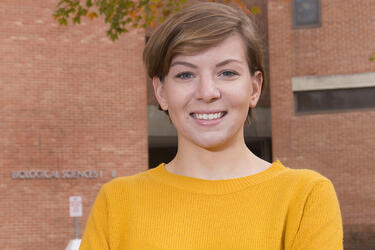At 9 years old, Megan Reed was given an assignment to create a PowerPoint presentation. She decided on marine biology for her presentation topic and with that her passion for water ecology was ignited.
As a Greenon high school student, she had heard about Wright State since it was close to home and several of her fellow classmates were planning to attend. Once at Wright State, Megan's passion for the water lead her to enroll in the university's scuba program where she earned her certification during her first term.
Scuba became one of her favorite courses and the scuba program coordinator
